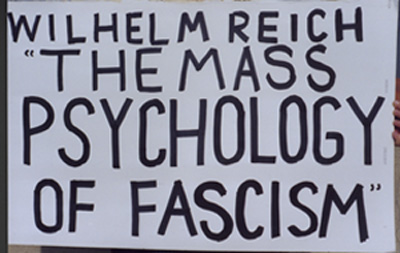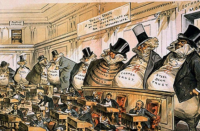As Communists, we should not be surprised by the rise of right-wing and neo-fascist groups in an orchestrated fashion all over the world, because fascism raises its head when capitalism is in decay. When the ruling class is no longer able to rule by persuasion, it uses coercion to maintain capitalist accumulation. Neoliberalism has pushed workers to an extreme, so that they are beginning to fight back and look for alternatives. Sooner rather than later, the rising people will find out that their lack of sovereignty and the reason for their misery is imperialism. The knee-jerk reaction from capitalist countries is evidence that capitalism is in a cul-de-sac.
But how is fascism ubiquitous in societies all over the world? What are the origins of fascism? Why does every capitalist country have its own version of fascism, depending on its cultural history? What provides the fertile soil for fascism? How did societies in Italy, in spite of the Renaissance movement, and Germany, in spite of its rich philosophical heritage, immerse themselves into fascism and Nazism? The Hungarian Marxist György Lukács cited the ‘destruction of reason’ as a factor for the spread of fascism in Europe; once people are made to believe in absurdities, they can be made to commit atrocities. Europe, which was once a cradle of modern thought, became a fertile ground for fascism.
Wilhelm Reich (WR) wrote a book called Mass Psychology of Fascism in 1933, which explored the role psychology plays in making the masses susceptible to a toxic ideology like fascism. WR argues that societies which suppress sexual expression tend to be authoritarian and hierarchical, and societies that allow free sexual expression are more democratic and egalitarian. He terms this ‘sex-economy’. The source of fascist ideology lies in the authoritarian and patriarchal family structure. The more a person is helpless in an authoritarian family structure, the more likely they are to identify with a supreme leader, and this becomes a basis for national narcissism.
WR says fascism is an international phenomenon with penetration into human organisations, irrespective of nation, race, etc.; in other words, fascism is the political expression of an average human character. WR says that racism is not a creation of fascism; however, fascism is a political expression of racial hatred. The fascist mentality among masses is a manifestation of the contradiction between a craving for authority and, at the same time, resentment against authority.
The penetration of fascism among workers in 20th-century Europe has to be understood from the background that the working-class movement was successful in improving living conditions through welfare measures, regulation of working hours, and voting rights, which created a middle class out of proletarians. At the same time, in those industrialised countries, this class was politically backward—this was the reason that revolutions happened in less developed nations like Russia and China. In industrialised Germany during the crisis in the 1930s, this middle-class worker, when faced with the danger of falling into poverty and caught in the oscillation between revolutionary feeling and conservative feeling, combined with disillusionment by the left leadership, switched over to the side of the fascists. Due to the upward social mobility of the working class, there is an evident change in its character. Along with social improvement, the working class adapts to the concept of “morality”, which is the ideology of the ruling class.
In the transformation of a classless society (primitive communism) into a class society, it was necessary to create an authoritarian family based on patriarchy to suppress sexuality. This religious mysticism projects sexuality as a sin, causing sexual guilt feelings resulting in sexual stasis. The pent-up sexual energy seeks outlets through pathological channels. This debased sexuality turns into support for fascist ideology. The mass psychology of fascism is born from patriarchal families and mystical religious attitudes. In primitive religions, religiosity and sexuality were identical, but once classes were formed, they became antagonistic. WR says it is an error to think that fascism is imposed on the masses against its own will; in fact, every dictator is an accentuation of already existing factors which the dictator only exaggerates in order to gain power.
WR was accused of pseudoscience during his time. There is a kind of reductionism in WR, saying that no freedom program can succeed without the alteration of the human sexual structure; sexual inhibition in adolescents and adults blocks the way to rational thinking; sexual suppression has the function of making people submissive and incapable of rebellion against their economic miseries. WR, in his criticism of the Soviet Union as ‘authoritarian’, does not take into account the challenge posed by imperialism to destroy the revolution immediately after it was born. WR does not explain why fascism raises its head when capitalism is in decay. When the Left says fascism has to be fought by working-class movements, he says fascism can be fought by understanding mysticism and through correct educational and medical measures. At the same time, he says that scientific enlightenment appeals only to the intellect of the masses and not its emotions. In short, Wilhelm Reich’s sex-economy posits that patriarchy suppresses sexuality, which makes humans incapable of freedom, which leads to fascism.
WR says that every revolution in Europe ended in authoritarian rule, but glorifies the US by saying that no totalitarian state could develop there, turning a blind eye to the fact that the US had its own version of fascism using the Ku Klux Klan, promoting white supremacy, racism against blacks, and the ethnic cleansing of indigenous people.
But is there an inherent nature in humans that makes fascism inevitable? Is it nature or nurture that decides human tendencies? Is it the economic crisis in capitalism that brings fascism to power, and an underlying mass psychology that makes people accept that power? These questions invite a lot of debate; however, history shows it is only through class struggle that fascism can be defeated.






